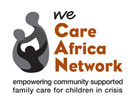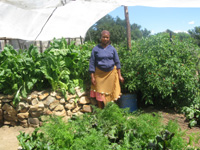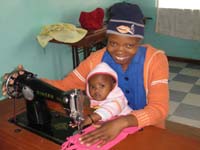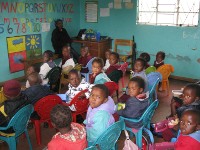
 |
| Home |
| Objectives |
| Initiatives |
| Donations |
| News from Africa |
| Training Courses |
| Links and Partners |
| Charity Job Opportunities |
| Contact Us |
African Community Initiatives
|
Despite widespread and increasing poverty, African communities are struggling and innovating to continue to meet the needs of orphans and vulnerable children within their extended families and communities. It has been estimated that for the cost of caring for one child in a damaging African institution, 1000 children could be permanently provided for by developing income generating projects in the community. Family based care is preferable as well as more cost effective than institutional based alternatives which alienate and institutionalise children and undermine sustainable community care systems. African Community initiatives are
remarkable, but need support to continue and develop to meet the unprecedented challenges
of the AIDS orphan crisis and other pressures - so that the needs of children
are still met within their extended families and communities as is the Africa
way. For example: ̶ Community support groups for children are formed. Community volunteers are trained to oversee the care and support of the orphans and vulnerable children in their village. They ensure each has a primary care giver within a family, (preferably their own family), and they mobilise the community to support needy families in providing good care for their children. This includes supervising the local community in growing food for orphans and vulnerable children and ensuring their holistic needs are met. ̶ Communities work together to grow food for orphans on communal land or by share cropping orphans' land. ̶ Community groups of needy families are trained in drought resistant permaculture, and they work together to build drought resistant gardens for each family, so that they can grow adequate food even in periods of drought, with enough to sell as well. This enables them to care for and educate their children and the orphans of dead relatives. ̶ Conservation agricultural methods are taught which enable good yields with minimal capital input and enable soil conservation for the future. ̶
Communities, families
and orphans are trained by local people in income generating activities. For
example, a young mother is enabled to make and market clothing, preventing her
from being forced to abandon her baby as she was previously unable to support him. ̶
Communities are
trained and supported in developing village savings and loans groups of needy
families, which enable each member to develop their income generating
activities from small initiatives at first, such as baking a few cakes, to
large successful businesses. This enables each member to care for and educate
their own children as well as many relatives' orphans. Members then train other
savings and loans groups and also work together to enable other changes needed
locally to benefit needy children. ̶ Community volunteers generate income for orphans so that they can attend school. ̶
Local people train
unemployed youth to build houses by facilitating them to rebuild housing needed
for orphans. This not only sets them up with an income generating activity for
the future, but also improves housing of needy children. For example, an
elderly grandmother lived in a tiny corrugated shack with her five orphaned
grand children until she was built a house and taught successful agriculture
methods, which enabled her to grow enough food for them all. ̶
Community
organisations and volunteers are trained in the prevention of child abuse and
to work together to eliminate this and ensure children receive good family
based care. ̶
Children are empowered
and taught skills to protect themselves and support themselves in the future
and to prevent the spread of HIV/AIDS. Care Africa Network supports and empowers such initiatives and disseminates ideas and successful methods to benefit more children.
|
|


